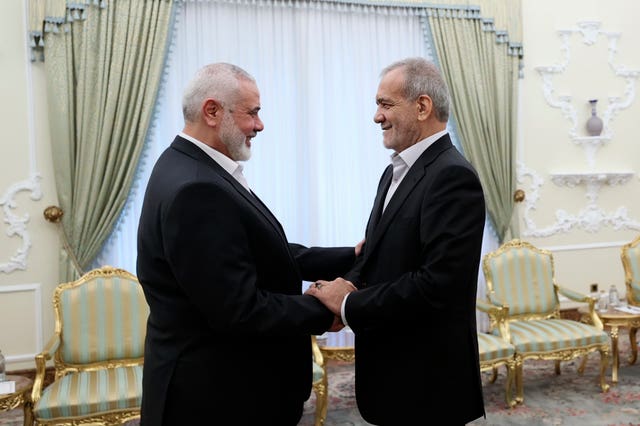Hamas says leader Ismail Haniyeh killed in air strike in Iran
Iran’s paramilitary Revolutionary Guard said it was investigating the attack and did not say how it occurred.

Hamas says its leader Ismail Haniyeh has been killed in an air strike on his residence in the Iranian capital.
The Palestinian militant group blamed Israel for an attack in Tehran which killed the head of its political bureau.
Iran’s President Masoud Pezeshkian condemned Mr Haniyeh’s killing, saying in a post on the X platform that his country will defend its territorial integrity and make those responsible regret their actions.
Iran’s paramilitary Revolutionary Guard said it was investigating the attack and did not say how it occurred.
Israel had vowed to kill Mr Haniyeh and other leaders of Hamas over the group’s October 7 attack on Israel that killed 1,200 people and saw some 250 others taken hostage.
An Israeli military spokesman did not immediately respond to a request for comment. Israel often does not comment on assassinations carried out by its Mossad intelligence agency.
Hamas said Mr Haniyeh was killed “in a Zionist air strike on his residence in Tehran” after he attended the swearing-in of Iran’s President Masoud Pezeshkian on Tuesday, along with other Hamas officials and officials from Hezbollah and allied groups.
“Hamas declares to the great Palestinian people and the people of the Arab and Islamic nations and all the free people of the world, brother leader Ismail Ismail Haniyeh a martyr,” Hamas said in its terse statement.
In another statement, the group quoted Mr Haniyeh as saying that the Palestinian cause has “costs” and “we are ready for these costs: martyrdom for the sake of Palestine, and for the sake of God Almighty, and for the sake of the dignity of this nation”.

Hamas officials did not immediately respond to requests for further comment.
In the West Bank, the internationally backed Palestinian President Mahmoud Abbas condemned Mr Haniyeh’s killing, calling it a “cowardly act and dangerous development”.
Political factions in the occupied territory called for strikes in protest at the killing.
Mr Haniyeh left the Gaza Strip in 2019 and had lived in exile in Qatar. The top Hamas leader in Gaza is Yehya Sinwar, who masterminded the October 7 attack.
In April, an Israeli air strike in Gaza killed three of Mr Haniyeh’s sons and four of his grandchildren.

In an interview with the Al Jazeera satellite channel at the time, Mr Haniyeh said the killings would not pressure Hamas into softening its positions amid ongoing ceasefire negotiations with Israel.
The killing of Mr Haniyeh comes after Israel carried out a rare strike on Beirut, which it said killed Fouad Shukur, a top Hezbollah military commander who was allegedly behind a weekend rocket attack that killed 12 young people in the Israeli-controlled Golan Heights.
Hezbollah has not confirmed Shukur’s death in the strike, which also killed at least one woman and two children and wounded dozens of people.
The strike came amid escalating hostilities with the Lebanese militant group. The US also blames Shukur for planning and launching the deadly 1983 Marine bombing in the Lebanese capital.
The US and other nations had already been scrambling to prevent the Golan Heights strike from spiralling into an all-out war between Israel and Hezbollah when word came of the dramatic assassination of Mr Haniyeh in Tehran.
There was no immediate reaction to the killing from the White House.
Turkey strongly condemned the “heinous assassination” of the Hamas leader, attributing the killing to the Israeli government.
A foreign ministry statement said the killing had shown that Israeli Prime Minister Benjamin Netanyahu’s government “has no intention of achieving peace”.





